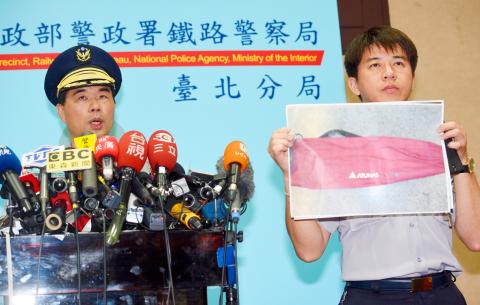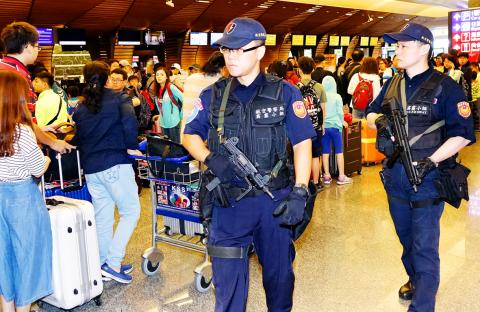Authorities yesterday said they have identified a suspect in Thursday’s Taipei train explosion, adding that preliminary findings have ruled out a terror attack.
The explosion, which occurred at about 10pm on Thursday in the sixth carriage of a commuter train as it headed into Songshan Railway Station (松山車站), injured 25 passengers.
Office of Homeland Security officials mobilized at the Songshan Railway Station to assist in the investigation.

Photo provided by Taiwan Railways Administration
After visiting the victims in hospital yesterday, Premier Lin Chuan (林全) said that initial findings indicated the explosion was a “malicious incident.”
“It was not an organized attack, but a major breach of public security by one individual,” he said, adding that he has asked authorities to get to the bottom of the case.
Sources cited three reasons for the government to discount links to terrorist organizations: information provided by the National Security Bureau showed there was no claim of responsibility by an organization or an individual; there also was no intelligence from at home or abroad to indicate international terrorists were entering Taiwan, nor were there indications of local terrorist cells operating within the nation; and the bomb was a small device that fits the pattern of ordinary criminal activities.

Photo: Lo Pei-der, Taipei Times
Investigators from the National Police Agency’s Criminal Investigation Bureau (CIB) worked through the night to examine the evidence and gather fingerprints at the carriage explosion site, including broken metal canister sections, along with a bag containing tools and tapes thought to have been left by the suspect.
Investigators said the device was a crudely made homemade pipe bomb, which suggested the suspect had learned how to make it from instructions on the Internet.
Witnesses said they saw a fireball following a loud explosion, then smoke filled the carriage, with many passengers sustaining burns and cuts, before receiving first aid and being rushed to hospitals for further treatment.

Photo: Chu Pei-hsiung, Taipei Times
After an initial investigation, the police yesterday identified Lin Ying-chang (林英昌) — one of six people who were seriously injured — as the probable suspect.
Lin Ying-chang, a 55-year-old resident of New Taipei City with prior convictions for minor crimes, is in intensive care and is unable to speak for the time being, the police said, adding that further investigation is needed to identify a motive.
After speaking with several witnesses to the explosion and collecting and analyzing the evidence on the scene, police said Lin Ying-chang, who was divorced and worked as a house painter and did various manual odd jobs, was believed to be holding the bomb when it went off.
The explosive device, which was a 47cm-long pipe bomb, was broken in two by the explosion, with one part found on the train by investigators, and the other found later on the tracks, a senior CIB forensics official told a news conference at 6pm.
CIB investigators found that the steel tube would have been able to contain between 500g and 1,000g of gunpowder, the forensics official said.
Wang Pao-chang (王寶章), chief of the Railway Police Bureau’s Taipei branch, told the news conference that it was likely the bomb had detonated by accident, as Lin Ying-chang allegedly assembled the materials in the washroom at the end of the carriage, based on witnesses who later identified Lin Ying-chang carrying the metal canister and said he was acting strangely.
“The fingerprints and DNA from Lin [Ying-chang] also matched those found on what was left of the bomb device and the tools,” Wang added.
CIB Forensic Examination Division head Yeh Chia-yu (葉家瑜) presented other evidence, including photographs of Lin Ying-chang’s blood-soaked, torn clothing, which indicated he sustained burns to his chest, limbs and groin, apparently from a direct blast impact at close distance, which were consistent with witness accounts of Lin carrying the canister device when it exploded.
Police have contacted Lin Ying-chang’s son and his ex-wife for questioning, and found an abandoned car in Nantou County, which they believe was left by Lin before he went to Taipei on Thursday.
Presidential Office spokesman Alex Huang (黃重諺) said the National Security Council has left the investigation after relevant government agencies ruled out terrorism.
Huang said the council immediately initiated a contingency response mechanism after the blast.
“In addition to maintaining close contact with the National Security Bureau and the Executive Yuan’s Office of Homeland Security to grasp the latest development, the council’s deputy secretaries-general and relevant officials had stayed at the council since the blast,” Huang said, adding that the council briefed President Tsai Ing-wen (蔡英文) regularly on the latest developments.
Additional reporting by Stacy Hsu and CNA

The paramount chief of a volcanic island in Vanuatu yesterday said that he was “very impressed” by a UN court’s declaration that countries must tackle climate change. Vanuatu spearheaded the legal case at the International Court of Justice in The Hague, Netherlands, which on Wednesday ruled that countries have a duty to protect against the threat of a warming planet. “I’m very impressed,” George Bumseng, the top chief of the Pacific archipelago’s island of Ambrym, told reporters in the capital, Port Vila. “We have been waiting for this decision for a long time because we have been victims of this climate change for

MASSIVE LOSS: If the next recall votes also fail, it would signal that the administration of President William Lai would continue to face strong resistance within the legislature The results of recall votes yesterday dealt a blow to the Democratic Progressive Party’s (DPP) efforts to overturn the opposition-controlled legislature, as all 24 Chinese Nationalist Party (KMT) lawmakers survived the recall bids. Backed by President William Lai’s (賴清德) DPP, civic groups led the recall drive, seeking to remove 31 out of 39 KMT lawmakers from the 113-seat legislature, in which the KMT and the Taiwan People’s Party (TPP) together hold a majority with 62 seats, while the DPP holds 51 seats. The scale of the recall elections was unprecedented, with another seven KMT lawmakers facing similar votes on Aug. 23. For a

Taiwan must invest in artificial intelligence (AI) and robotics to keep abreast of the next technological leap toward automation, Vice President Hsiao Bi-khim (蕭美琴) said at the luanch ceremony of Taiwan AI and Robots Alliance yesterday. The world is on the cusp of a new industrial revolution centered on AI and robotics, which would likely lead to a thorough transformation of human society, she told an event marking the establishment of a national AI and robotics alliance in Taipei. The arrival of the next industrial revolution could be a matter of years, she said. The pace of automation in the global economy can

All 24 lawmakers of the main opposition Chinese Nationalists Party (KMT) on Saturday survived historical nationwide recall elections, ensuring that the KMT along with Taiwan People’s Party (TPP) lawmakers will maintain opposition control of the legislature. Recall votes against all 24 KMT lawmakers as well as Hsinchu Mayor Ann Kao (高虹安) and KMT legislative caucus whip Fu Kun-chi (傅崐萁) failed to pass, according to Central Election Commission (CEC) figures. In only six of the 24 recall votes did the ballots cast in favor of the recall even meet the threshold of 25 percent of eligible voters needed for the recall to pass,